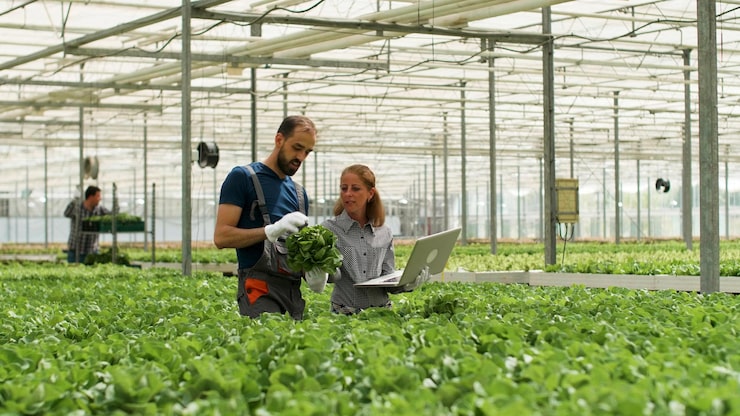Organic farming startups are becoming one of the most influential forces in modern agriculture. With the growing awareness of health, sustainability, and climate change, these businesses are not only revolutionizing how food is grown but also how it reaches the consumer. By supporting eco-friendly methods, reducing chemical use, and promoting farmer empowerment, they are helping to reshape the agricultural landscape for a healthier tomorrow.
The Rise of Organic Farming Startups
Over the last decade, organic farming startups have gained tremendous traction worldwide. Consumers are demanding food that is free from harmful pesticides, fertilizers, and chemicals. This has opened up opportunities for entrepreneurs to create innovative solutions that bridge the gap between farmers and health-conscious consumers.
For instance, many startups are offering farm-to-table delivery models that ensure fresh produce reaches households without losing its nutritional value. By combining technology and traditional farming practices, these ventures are addressing issues of food safety, traceability, and sustainability.
Why Organic Farming Startups Matter Today
The significance of organic farming startups lies in their ability to solve some of the pressing issues in agriculture. Conventional farming often relies heavily on chemical-based fertilizers and pesticides, which degrade soil health and harm biodiversity. Startups in the organic sector focus on natural fertilizers, crop rotation, and sustainable practices that maintain soil fertility.
Moreover, the demand for organic produce is steadily increasing in both urban and rural markets. People are willing to pay a premium for food that is safe, healthy, and environmentally friendly. This demand is a major driving factor that has allowed these startups to thrive despite challenges.
Organic Farming Startups and Farmer Empowerment
One of the most notable contributions of organic farming startups is farmer empowerment. Many small-scale farmers face difficulties transitioning to organic methods due to lack of knowledge, certification hurdles, and market access. Startups are stepping in to provide training, resources, and direct connections to buyers.
For example, certain companies are offering mobile apps that guide farmers through organic practices, pest management without chemicals, and crop planning for maximum yield. Others help farmers get certified by simplifying documentation and connecting them with buyers who value certified organic produce.
Technology and Innovation in Organic Farming Startups
Technology has become the backbone of modern organic farming startups. From IoT devices that monitor soil health to AI-based platforms predicting crop diseases, innovations are ensuring better yields while adhering to sustainable practices.
Drone-based monitoring systems are also being used to observe fields in real-time, reducing the reliance on harmful chemicals. Data analytics tools provide farmers with insights into weather conditions, irrigation planning, and crop rotation cycles. These solutions make organic farming more practical and scalable.
Successful Organic Farming Startups Making an Impact
Several organic farming startups have already proven that this sector has incredible potential. Startups like “Farmizen” in India connect consumers directly with farmers, allowing them to adopt a plot of land and receive fresh organic produce weekly. In the U.S., companies like “Farmer’s Fridge” and “Thrive Market” are expanding access to organic food in innovative ways.
In Europe, brands such as “Oddbox” are tackling food waste by selling surplus and odd-shaped organic produce directly to consumers. These examples show how entrepreneurship and sustainability can combine to create real-world impact.
Challenges Faced by Organic Farming Startups
Despite their success, organic farming startups face significant challenges. High certification costs, limited consumer awareness in certain regions, and logistical barriers remain obstacles. Organic farming often requires more manual labor compared to conventional methods, which can increase costs.
However, government policies, subsidies, and increasing global awareness are helping overcome these hurdles. Many startups are also collaborating with NGOs and corporates to scale their reach and impact.
The Future of Organic Farming Startups
The future of organic farming startups looks bright as sustainability becomes a global priority. With climate change creating unpredictable weather patterns and environmental concerns mounting, sustainable agricultural models are no longer optional—they are essential.
Startups that combine traditional wisdom with modern technology are poised to lead this revolution. They are not just offering healthy food alternatives but also redefining how we view farming, community health, and environmental stewardship.
As investors and consumers continue to support eco-conscious initiatives, organic farming startups will likely expand rapidly in the coming years. This growth will benefit farmers, consumers, and the planet as a whole, creating a food system that is sustainable, fair, and future-ready.
Read also:
bangladesh national cricket team vs zimbabwe national cricket team match scorecard
australian men’s cricket team vs england cricket team match scorecard
sri lanka national cricket team vs new zealand national cricket team match scorecard
pakistan national cricket team vs australian men’s cricket team match scorecard


